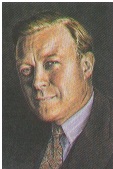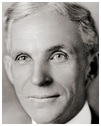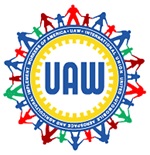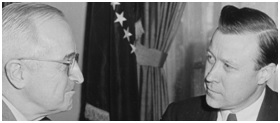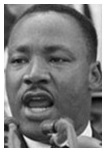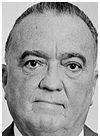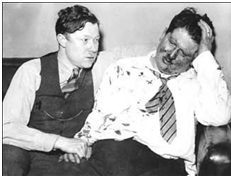|
 |
|
 |
|
|
||
Walter Reuther - Success, Work and Unions
Walter Reuther (1907-70)
American leader (pictured right) of the United Automobile Workers (UAW) trade (or labour) union which forced the big car companies to pay its members bigger wage increases. Also see.... The Battle of the Overpass in the History Highlights section, when Reuther and three other union organizers were beaten up by the car maker, Henry Ford's (pictured right) employees.
Why was Reuther successful? 1. Vision He wanted the UAW to:
He saw the value of small, inexpensive cars long before the American car companies did. 2. Principles Reuther (pictured right with President Harry S. Truman in 1952):
a) strongly believed in the UAW (to improve workers’ pay, other benefits (like pensions and longer holidays) and working conditions - see points 3 and 4).
b) was anti-communist He was a vehement opponent of the Soviet Union (then the name for communist Russia).
c) supported equality, justice and prosperity for all He strongly supported:
He spoke at the March on Washington rally in 1963 (pictured right, second from the right), when Martin Luther King gave his “I have a dream” speech (pictured right below). 3. People first Reuther fought all his life for the belief that people must come first in business and society He believed that people’s happiness depends on
“Making progress with the community, not at the expense of the community” was his aim.
4. Co-operation He wanted to co-operate with managers to:
In 1948 he struck a historic deal in which General Motors (in return for no strikes) gave:
5. Courage He forced Henry Ford and Alfred Sloan (at General Motors, pictured right) to recognize his union, the UAW, In the Battle of the Overpass
(1937) he and three other union officials were beaten up at Ford’s factory by 40 men, some of
them gangsters, when distributing leaflets for the union. He helped to organize two major, victorious strikes against:
He also fought against corruption and the influence of gangsters in his union. A gunman tried to kill him and his wife in their kitchen in 1948, and he was watched for 40 years by J. Edgar Hoover’s (pictured right above) FBI. 6. Great communicator He was a brilliant negotiator and publicist. At the Battle of the Overpass(pictured right on the left after being beaten up) , he brought along a press photographer, who sent pictures of his attack throughout America. He also communicated his messages with snappy slogans like “Too Old to Work - Too Young to Die” (which supported his negotiations for worker pensions).
Key quote on negotiating If you’re not big enough to lose, you’re not big enough to win.
Key quote on society Making progress with the community, not at the expense of the community.
Key quote on objectives and vision There is no greater calling than to serve your fellow men. There is no greater contribution than to help the weak. There is no greater satisfaction than to have done it well.
Key quote on workers and unions Fight for the welfare of the public at large. |
|
|
||
|
|
||
| Copyright © wisdomtowin.com 2025 All Rights Reserved | ||
|


